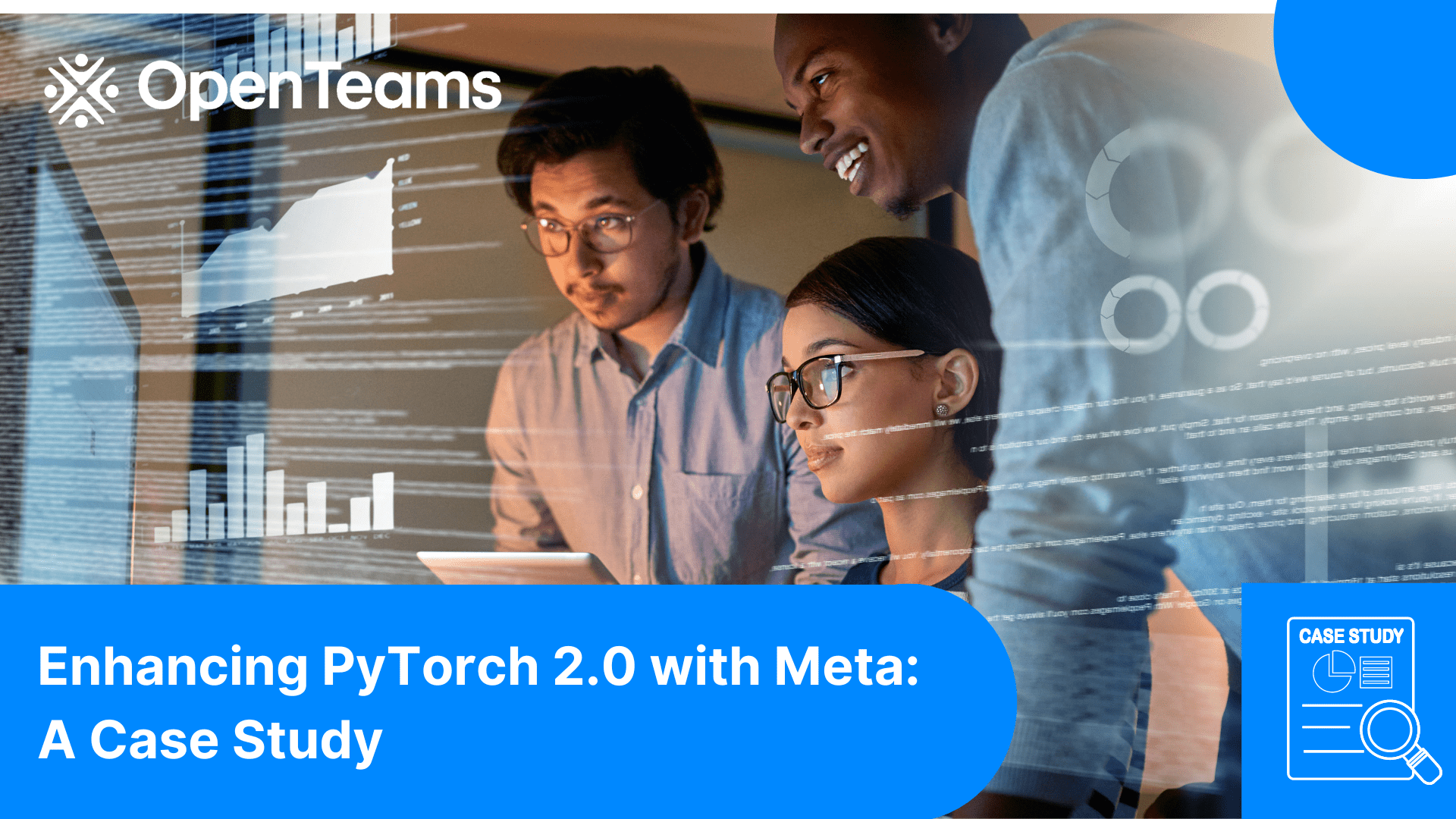Enhancing PyTorch 2.0 with Meta: A Case Study

Unleashing the Power of PyTorch 2.0: Collaborative Enhancements
Introduction
The year 2022 witnessed significant milestones and advancements in the PyTorch ecosystem, including PyTorch’s affiliation with the Linux Foundation and the release of PyTorch 2.0. Quansight, an OpenTeams partner, played a crucial role in collaborating with the PyTorch team at Meta to enhance the PyTorch project. This case study explores the various contributions and improvements made by Quansight to PyTorch 2.0 and beyond.
PyTorch 2.0
The release of PyTorch 2.0 was a major highlight in 2022. The notable addition in this release was a powerful and user-friendly compiler for PyTorch programs. Quansight engineers contributed to the development of several subsystems within PyTorch 2.0.
Decompositions: PrimTorch
Quansight engineers played a significant role in designing and implementing the desugaring process, known as PrimTorch, which involved representing PyTorch operations using simpler operations. They also contributed to building the testing infrastructure to ensure the correctness of these operations.
Compiler: TorchInductor
Another essential component of the PyTorch 2.0 compiler was TorchInductor. Quansight engineers participated in implementing optimization passes to generate faster code using TorchInductor.
Dynamic Shapes
Quansight engineers collaborated in addressing correctness issues related to dynamic shapes in PyTorch 2.0. Dynamic shapes allowed for tracing programs and symbolically tracking the size of dimensions, resulting in efficient model compilation and generic models compatible with arbitrary lengths and batches.
NumPy with PyTorch as Backend
Quansight worked on implementing an interface that enables NumPy computations to run on PyTorch as a backend, allowing seamless integration of existing NumPy models with PyTorch’s autograd and CUDA acceleration capabilities.
SciPy and scikit-learn with PyTorch as Backend: Python Array API
Quansight’s team contributed to the implementation of the Python Array API within PyTorch, enabling users to leverage PyTorch as the backend for their programs using NumPy, SciPy, or scikit-learn. This integration facilitated the creation of compiled CUDA versions of scikit-learn algorithms with differentiation support.
Additional Compiler Backends
Quansight’s ongoing work involved delivering a transpiler that translates PyTorch programs from Python to C++, leveraging PyTorch’s C++ API for improved performance without requiring users to write C++ code directly. This integration aimed to provide efficient compiled functions without the overhead of Python execution.
Scientific PyTorch
Quansight, with its expertise in scientific domains and contributions to the SciPy community, extended PyTorch’s functionality to cover popular SciPy modules and beyond, making it a suitable choice for scientific applications.
Sparse Tensors
Quansight engineers collaborated with the torch.sparse team to enhance the support for sparse tensors in PyTorch. This involved expanding support for data types, layouts, and performance improvements in sparse-sparse and sparse-dense matrix multiplications, as well as autograd integration.
JAX-like Function Transforms: torch.func
Quansight engineers contributed to the implementation of the torch.func module, providing higher-order functions for vectorization, forward and backward vector products, and per-sample gradients in PyTorch. They helped implement these operations for PyTorch operators, enabling functionalities similar to JAX.
Complex Half: torch.complex32
Quansight engineers worked on the implementation of half-precision complex numbers (complex32) in PyTorch, optimizing compilation times and reducing the size of binaries.
torch.signal.windows
In collaboration with the open-source community, Quansight engineers assisted in implementing SciPy’s signal.windows module within PyTorch, facilitating digital signal processing tasks.
Performance Optimizations
Quansight’s expertise in code optimization led to several performance improvements in PyTorch, including speedups in torch.matmul, unary operators, type conversions, torch.flip, torch.norm, and torch.sort(dim).
Maintainability
Quansight engineers played a vital role in maintaining PyTorch, refactoring subsystems, improving build times, unifying storage interfaces, supporting torch.linalg and torch.fft modules, and enhancing the testing infrastructure.
TorchVision
Quansight contributed to TorchVision, an extension library for PyTorch, by designing and developing the Transforms API 2.0, making data preprocessing more flexible and efficient for modern vision tasks. They also worked on video codecs support to handle different video formats effectively.
Conclusion
Quansight’s collaboration with the PyTorch team at Meta resulted in significant advancements and improvements in PyTorch 2.0 and TorchVision. Their contributions spanned various areas, including compiler development, dynamic shapes, NumPy integration, scientific functionalities, sparse tensors, JAX-like function transforms, performance optimizations, maintainability, and TorchVision enhancements. These collaborative efforts paved the way for a more powerful and user-friendly PyTorch ecosystem, benefitting developers and researchers working with deep learning and scientific applications.
About OpenTeams
OpenTeams is a premier provider of open source solutions for businesses worldwide. Our goal is to help organizations optimize their open source technologies through tailored support solutions that meet their unique needs. With over 680+ open source technologies supported, we provide unparalleled expertise and resources to help businesses achieve their goals. Our flexible support plans allow organizations to pay for only what they need, and our team of experienced Open Source Architects is available 24/7/365 to provide top-notch support and guidance. We are committed to fostering a community of innovation and collaboration, and our partner program offers additional opportunities for growth and success.
About Quansight
Quansight is a renowned company that specializes in machine learning, data science, and open-source technologies. With their deep expertise in these domains, Quansight offers comprehensive solutions and services to organizations seeking to leverage the power of data and AI. They are known for their proficiency in developing customized machine learning models, optimizing algorithms, and implementing cutting-edge technologies to solve complex business challenges. Quansight’s team of experts possesses a deep understanding of open-source frameworks and tools, enabling them to deliver innovative solutions that are scalable, cost-effective, and aligned with the unique requirements of their clients. Their commitment to excellence and their ability to leverage open-source technologies make Quansight a trusted partner for organizations looking to unlock the full potential of their data.
Unlock the power of open source for your business today
OpenTeams provides businesses with access to a team of experienced open source professionals who can help them unlock the power of open source technologies, delivering customized solutions tailored to their specific needs and goals. Get in touch with us today to learn how we can help you leverage open source to achieve your business objectives.
